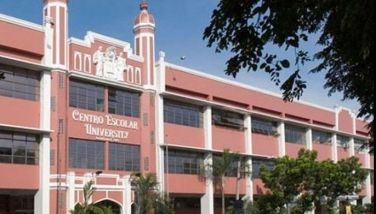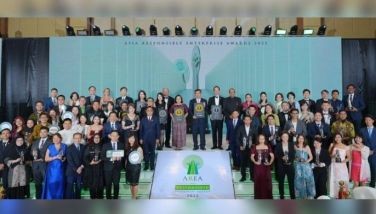Beyond corporate social responsibility

There is no need for us to have a tycoon or a CEO in Malacañang for quick results. They don’t have to be President to do the essential things the country needs. Whether it is cleaning a river, feeding the hungry or educating our youth, there are always opportunities to reduce the national misery index by using private resources that tycoons have.
Forget corporate philanthropy or corporate social responsibility projects. Those are mere public relations efforts whose success is measured in column inches and minutes of exposure rather than in lives changed. We need CSR Plus, which is more about social entrepreneurship. These efforts must make a difference and not just be token activities to make a conglomerate look good. The Ayala Group’s Centex program, or Center for Excellence pilot elementary school classes, is a good example.
When Centex was launched in 1998, its aim was to provide quality education for bright children from poor families. It started with two DepEd Centex schools in Manila and Batangas. It expanded to create a Centex Training Institute, which provides training and mentoring to teachers, and the Centex Early Childhood Care and Development Program, which supports daycare teachers, students and families in fostering a strong foundation for lifelong learning.
I don’t know how updated the Centex website is, but it claims that their pupils achieved a 100 percent graduation rate at Grade 6, compared to the 68.5 percent nationwide average. They have also reached 142 public elementary school teachers, providing them with the training they need to be more effective.
The success of Centex shows it is a program the country needs. By being limited to just a school in Manila and another in Batangas, its potential for good is wasted. The concept should be “franchised” by now, because the Ayala Group does not seem inclined to support its expansion.
When Secretary Sonny Angara spoke before the Foundation for Economic Freedom a few weeks ago, he mentioned partnering with Khan Academy to improve teaching methods and skills. Sec. Sonny said that they have even started to translate the teaching modules of Khan Academy into dialects, with good results in terms of learning. This is another tested program that ought to be used nationwide under the sponsorship of some of our large conglomerates.
No need to reinvent the wheel. Socially conscious taipans and CEOs can finance the rollout of these tested programs, starting in what Sec. Sonny calls “last-mile schools” that have long been neglected because they are so geographically isolated.
A mining or energy company operating in the boondocks can perhaps arrange with Ayala to use Centex to upgrade the quality of elementary education in the locality of their operations. They have to start with feeding the kids so their brains can develop properly and be able to absorb learning. It would be heartwarming to see those isolated kids not lose out to the rest of their peers who live in bigger municipalities.
Another good project is Jollibee working with groups of farmers to grow vegetables they need – like how to grow potatoes with the quality that would enable the farmers to sell their produce to Jollibee. Getting the farmers into their supply chain is not philanthropy but social entrepreneurship. It helps the farmers who would otherwise be abused by the usual traders. I have met those Jollibee farmers, and they are proud that they are being treated as business partners rather than charity cases.
Reacting to my column last Monday, The STAR reader Romy Salvador wrote: “SM needs more investment in producing something like food production. The secret of Ukraine is corporate farms which are highly productive. Remove land reform and we will have no food shortage problem.”
I checked Google AI, and yes, “a significant portion of Ukraine’s agricultural land is farmed by enterprises larger than 1,000 hectares. Some of the largest agricultural companies in Ukraine are vertically integrated, meaning they control multiple stages of the production process, from farming to processing.”
I have been telling Tessie Sy-Coson that it is a good idea to use SMDC’s idle land-banked properties in urban areas to grow vegetables. Someone is doing it on a small plot of land at BGC. San Miguel has been using their head office employees to plant vegetables around their expansive Ortigas property.
The SM Group should do something like what Manny Pangilinan is doing with an Israeli group to introduce hydroponic growing of vegetables in Bulacan. Urban farms using hydroponic and similar technology are the future of growing food for our urban population.
The SM Group could also work out a deal with the Agrarian Reform department to launch our first corporate rice farm benefiting agrarian reform beneficiaries. We need a good demonstration farm showing how we ought to grow our staple crop using economies of scale and the most modern technology. This surely beats building more malls if the Sy-blings want to pay back the Filipinos who nurtured their family, starting when their father was a humble immigrant from China, to their current status as our country’s number one conglomerate.
In the meantime, SM, Robinsons, Gaisano and other groups with supermarkets nationwide should work with the government in importing our rice requirements. This is how to break the hold of the shadowy rice cartel that has been our problem for so long. The conglomerates can import the rice in bulk, repack it into retail-sized bags for sale in their supermarkets. It will be easier for authorities to control rice retail prices by working with the conglomerates.
There are many things our corporate sector can do to ease social problems by using the business resources they already have. The problems of our country today should not be allowed to escalate into a full-blown crisis. Our business elite should do whatever they can to make things better.
Boo Chanco’s email address is bchanco@gmail.com. Follow him on X @boochanco
- Latest
- Trending

































